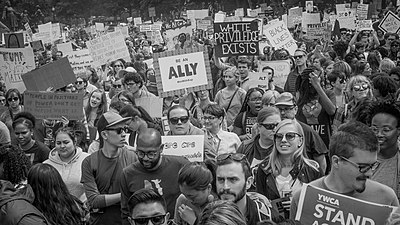Secure record linkage of large health data sets: Evaluation of a hybrid cloud model
Contents
Philip N. Cohen | |
|---|---|
 Philip N. Cohen | |
| Born | 1967 (age 56–57) |
| Nationality | American |
| Alma mater | University of Michigan (BA); University of Massachusetts (MA in Sociology); University of Maryland (PhD in Sociology) |
| Scientific career | |
| Fields | Sociology and demography |
| Institutions | University of California, Irvine (1999-2005), University of North Carolina (2005-2011), University of Maryland (2011-) |
| Website | philipncohen |
Philip N. Cohen is an American sociologist. He is a Professor of Sociology at the University of Maryland, College Park,[1] and director of SocArXiv, an open archive of the social sciences.[2]
Early life
Cohen grew up in Ithaca, New York and attended the Lehman Alternative Community School.[3]
Career
Cohen graduated from the University of Michigan with a B.A. in American Culture, from the University of Massachusetts with an M.A. in Sociology, and from the University of Maryland with a Ph.D. in Sociology. His previous faculty positions were at the University of North Carolina and the University of California, Irvine.[4]
He is a sociologist and demographer who works in the areas of families and inequality, social demography, and social inequality. His concerns include gender and race/ethnic inequality, unpaid housework and care work, health disparities, demographic measurement, and open science.[5]
He is a former member of the American Sociological Association (ASA) Committee on Publications,[6] and chair of the ASA's section on Sociology of the Family.[7] He also is an Associate of the Maryland Population Research Center,[8] and was formerly secretary-treasurer of the ASA Population Section.[9] He was co-editor, with Syed Ali, of Contexts, the quarterly magazine of the ASA, from 2014 to 2017.
Since 2016, he has been the director of SocArXiv, and has devoted increasing efforts to the movement for open science, including research in scholarly communication.[10] In 2021 Cohen left the American Sociological Association, citing what he called its high costs, lack of capacity for change, inequitable practices, and opposition to open access and open science in its publications.[11]
Books
Cohen has written two books:
- The Family: Diversity, Inequality, and Social Change, first published in 2014 by W. W. Norton & Company; the fourth edition was published in 2024.[12]
- Enduring Bonds: Inequality, Marriage, Parenting, and Everything Else That Makes Families Great and Terrible, published in 2018 by the University of California Press.[13]
He is co-editor, with Syed Ali, of The Contexts Reader, a collection of essays from the magazine Contexts, the quarterly magazine of the American Sociological Association.[14]
Research
Cohen's paper on divorce, "The Coming Divorce Decline,"[15] reported a drop in U.S. divorce rates from 2008 to 2017, and predicted further declines in the coming years.
His work on labor market inequality has focused on race/ethnic and gender inequality in the United States. On race, he has published in the American Journal of Sociology[16] (with Matt Huffman) and Social Forces,[17] assessing the relationship between demographic composition of labor markets and patterns of inequality.
In the area of gender inequality, his research (with Matt Huffman) has addressed occupational segregation and gender devaluation[18] and the effects of women in workplace management positions.[19][20] Alone as well as with a number of different co-authors, he has published research on the gender division of household labor.[21][22][23][24]
On family structure, he has addressed issues of measurement, including how to identify cohabiting couples in U.S. Census data.,[25] and the language used for marriage (homogamy and heterogamy).[26]
On health disparities, he has studied the COVID-19 pandemic in rural U.S. counties,[27] marriage and mortality,[28] disability rates among adopted children,[29] the living arrangements of children with disabilities,[30] the relationship between parental age and childhood disability,[31] and race/ethnic disparities in infant mortality.[32]
Some of Cohen's research is part of the tradition of intersectionality, including his work on the American women's suffrage movement;[33] and on the relationship between population composition and inequality by race, class and gender.[34]
Congressional testimony
In 2007, Cohen testified before the U.S. Senate Committee on Health, Education, Labor, and Pensions, on equal pay for women workers.[35] The legislation under consideration at that hearing eventually became the Lilly Ledbetter Fair Pay Act of 2009.
Public work
Cohen has been the author of the Family Inequality blog since 2009.[36]
His writing has appeared in The New York Times Sunday Review,[37] The Washington Post,[38][39] The Chronicle of Higher Education,[40] The Daily Beast,[41] Boston Review,[42] CNN,[43] the Hill,[44] The New Republic,[45] and others.[46]
In 2011 he served as a consultant to the United States Census Bureau for its release of the first enumeration of same-sex married couples from the 2010 decennial census.[47]
Cohen is an advocate for open scholarship and open access for academic research.[48] He organized SocArXiv, an open research repository for the social sciences.[49] SocArXiv launched Open Scholarship for the Social Sciences (O3S), a conference at the University of Maryland, in 2017.[50]
He was a plaintiff in the lawsuit Knight First Amendment Institute v. Trump, filed July 11, 2017. In the lawsuit, a group of Twitter users blocked by U.S. President Donald Trump's account alleged that this blocking was a violation of their First Amendment rights.[51] The case was decided in the plaintiffs' favor on May 23, 2018,[52] and that decision was upheld by the United States Court of Appeals for the Second Circuit.[53] After Trump's presidency ended before the Supreme Court heard his appeal, the Court vacated the decision as moot on April 5, 2021.[54]
In 2021 Cohen organized an open letter of more than 150 demographers and social scientists to the Pew Research Center, urging them to stop using generation labels in their analysis of social trends.[55] In 2023, after an extensive review of their research and methods, Pew announced a change in their use of generation labels, to "avoid reinforcing harmful stereotypes or oversimplifying people’s complex lived experiences" and said, in the future, "our audiences should not expect to see a lot of new research coming out of Pew Research Center that uses the generational lens.[56]
Photography
Cohen's photography has appeared in Contexts magazine,[57] and in news reports.[58]
References
- ^ Philip N. Cohen website
- ^ SocArXiv
- ^ "How ACS Inspired Philip Cohen's Crusade for Equality," Four from Four: Lehman Alternative Community School's Alumni Journal.
- ^ Philip N. Cohen
- ^ Google Scholar list of publications
- ^ ASA Committee on Publications webpage
- ^ ASA Family Section webpage
- ^ Maryland Population Research Center
- ^ ASA Population Section
- ^ Open Science
- ^ Cohen, Philip N. (6 November 2021). "Why I'm Leaving the American Sociological Association". Family Inequality. Archived from the original on 15 December 2021. Retrieved 22 January 2022.
- ^ The Family: Diversity, Inequality, and Social Change at Norton
- ^ Enduring Bonds at University of California Press
- ^ The Contexts Reader at W. W. Norton.
- ^ Cohen, Philip N. (2018). "The Coming Divorce Decline". SocArXiv. doi:10.31235/osf.io/h2sk6.
- ^ Huffman, Matt L.; Cohen, Philip N. (2004). "Racial Wage Inequality: Job Segregation and Devaluation Across U.S. Labor Markets". American Journal of Sociology. 109 (4): 902–936. CiteSeerX 10.1.1.560.2662. doi:10.1086/378928. JSTOR 10.1086/378928. S2CID 154979334.
- ^ Cohen, Philip N (1998). "Black Concentration Effects on Black-White and Gender Inequality: Multilevel Analysis for U.S. Metropolitan Areas". Social Forces. 77 (1): 207–229. doi:10.1093/sf/77.1.207. JSTOR 3006015.
- ^ Cohen, Philip N.; Huffman, Matt L. (2003). "Individuals, Jobs, and Labor Markets: The Devaluation of Women's Work". American Sociological Review. 68 (3): 443–63. doi:10.2307/1519732. JSTOR 1519732.
- ^ Cohen, Philip N.; Huffman, Matt L. (2007). "Working for the Woman? Female Managers and the Gender Wage Gap". American Sociological Review. 72 (5): 681–704. doi:10.1177/000312240707200502. S2CID 37110842.
- ^ Huffman, Matt L.; Cohen, Philip N.; Pearlman, Jessica (2010). "Engendering Change: Organizational Dynamics and Workplace Gender Segregation, 1975-2005". Administrative Science Quarterly. 55 (2): 255–277. doi:10.2189/asqu.2010.55.2.255. S2CID 1880151.
- ^ Cohen, Philip N (2004). "The Gender Division of Labor: 'Keeping House' and Occupational Segregation in the United States". Gender and Society. 18 (2): 239–252. doi:10.1177/0891243203262037. JSTOR 4149435. S2CID 18231053.
- ^ Batalova, Jeanne A. (2002). "Premarital Cohabitation and Housework: Couples in Cross-National Perspective". Journal of Marriage and Family. 64 (3): 743–755. CiteSeerX 10.1.1.470.7312. doi:10.1111/j.1741-3737.2002.00743.x.
- ^ Fuwa, Makiko (2007). "Housework and social policy". Social Science Research. 36 (2): 512–530. doi:10.1016/j.ssresearch.2006.04.005.
- ^ Geist, Claudia (2011). "Headed Toward Equality? Housework Change in Comparative Perspective". Journal of Marriage and Family. 73 (4): 832–844. doi:10.1111/j.1741-3737.2011.00850.x. PMC 3898932. PMID 24465055. S2CID 6682719.
- ^ Casper, Lynne M.; Cohen, Philip N. (2000). "How Does POSSLQ Measure Up? Historical Estimates of Cohabitation". Demography. 37 (2): 237–45. doi:10.2307/2648125. JSTOR 2648125. PMID 10836181. S2CID 31769045.
- ^ Cohen, Philip N. (2011). "Homogamy Unmodified". Journal of Family Theory & Review. 3: 47–51. doi:10.1111/j.1756-2589.2010.00080.x.
- ^ Cohen, Philip N. (2020). "The COVID-19 Epidemic in Rural U.S. Counties". SocArXiv. doi:10.31235/osf.io/pnqrd. S2CID 219814569.
- ^ Cohen, Philip N. (2019). "The rising marriage mortality gap among Whites". SocArXiv. doi:10.31235/osf.io/8374m. S2CID 243040946.
- ^ Kreider, Rose; Cohen, Philip N. (2009). "Disability Among Internationally Adopted Children in the United States". Pediatrics. 124 (5): 1311–1318. doi:10.1542/peds.2008-3206. PMID 19858154. S2CID 16891927.
- ^ Cohen, Philip N. (2006). "Gendered Living Arrangements Among Children With Disabilities". Journal of Marriage and Family. 68 (3): 630–638. doi:10.1111/j.1741-3737.2006.00279.x.
- ^ Cohen, Philip N (2014). "Parental Age and Cognitive Disability among Children in the United States". Sociological Science. 1: 102–110. doi:10.15195/v1.a8. hdl:1903/15041.
- ^ Cohen, Philip N (2016). "Maternal Age and Infant Mortality for White, Black, and Mexican Mothers in the United States". Sociological Science. 3: 32–38. doi:10.15195/v3.a2. hdl:1903/18789.
- ^ Cohen, Philip N. (1996). "Nationalism and Suffrage: Gender Struggle in Nation-Building America". Signs. 21 (3): 707–727. doi:10.1086/495103. JSTOR 3175176. S2CID 145659343.
- ^ Cohen, Philip N. (2001). "Race, Class, and Labor Markets: The White Working Class and Racial Composition of U.S. Metropolitan Areas". Social Science Research. 30: 146–169. CiteSeerX 10.1.1.497.3381. doi:10.1006/ssre.2000.0693.
- ^ Senate HELP Committee testimony
- ^ Family Inequality blog
- ^ Philip Cohen op-ed in The New York Times Sunday Review
- ^ Philip Cohen op-ed about generation labels in Washington Post
- ^ Philip Cohen op-ed about child poverty in Washington Post
- ^ Philip Cohen op-ed in The Chronicle of Higher Education
- ^ Philip Cohen author profile at thedailybeast.com
- ^ Philip Cohen contributions to Boston Review
- ^ "The divorce fairness issue that Jeff and MacKenzie Bezos don't have to worry about"
- ^ "Millennials are getting divorced less but aren't living happily ever after". The Hill. 2018-09-28. Archived from the original on 2021-10-18.
- ^ Philip Cohen author profile at The New Republic
- ^ List of media references
- ^ Census Bureau news release
- ^ Philip Cohen essay on SocOpen.org
- ^ SocArXiv website
- ^ O3S website
- ^ Neumeister, Larry (July 11, 2017). "Trump sued for blocking some of his critics on Twitter". The Washington Post. Associated Press. Archived from the original on July 11, 2017. Retrieved July 12, 2017.
- ^ "Trump's Blocking of Twitter Users Is Unconstitutional, Judge Says". The New York Times. May 23, 2018. Retrieved May 23, 2018.
- ^ Spangler, Todd (March 23, 2020). "Donald Trump Violated First Amendment by Blocking Critics on Twitter, Appeals Court Affirms". Variety. Retrieved March 23, 2020.
- ^ https://www.supremecourt.gov/orders/courtorders/040521zor_3204.pdf [bare URL PDF]
- ^ Philip Cohen op-ed about generation labels in Washington Post
- ^ Pew Research Center announcement about use of generation labels
- ^ "It's Better to be Angry Together". Contexts. Fall 2017. Retrieved October 26, 2018.
- ^ "Vacation home a total loss after Outer Banks fire". WTKR. August 23, 2018. Retrieved October 26, 2018.


















